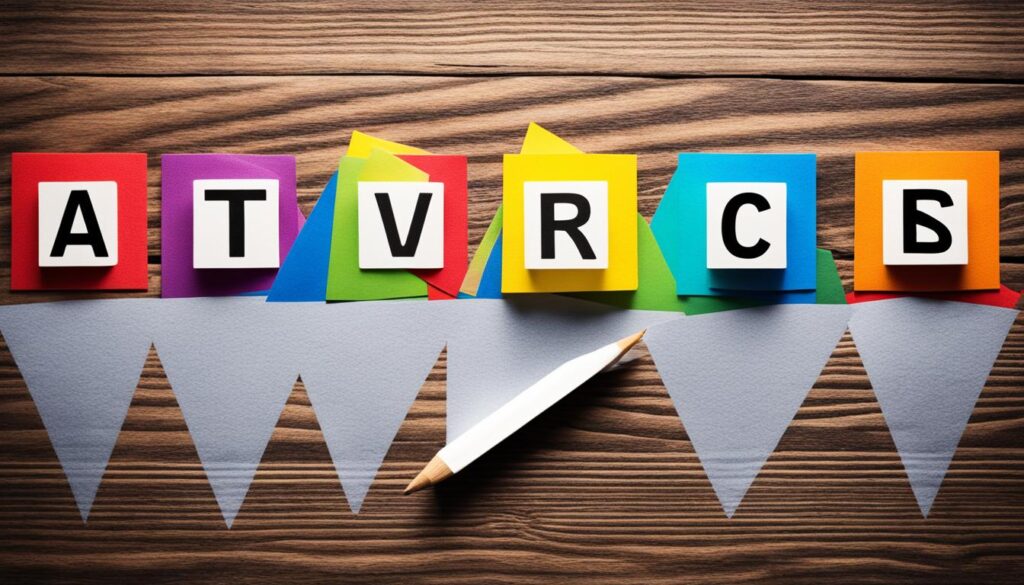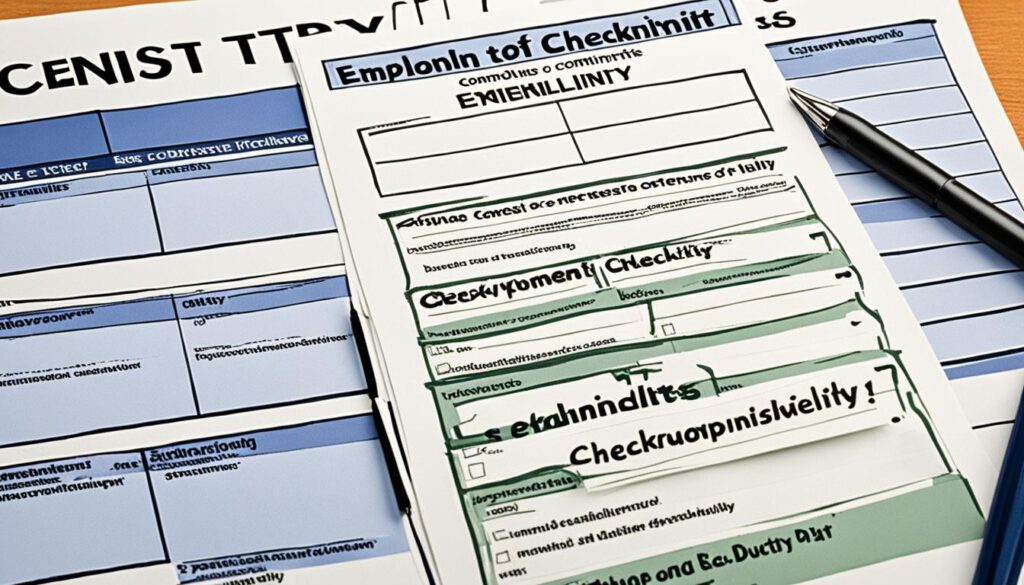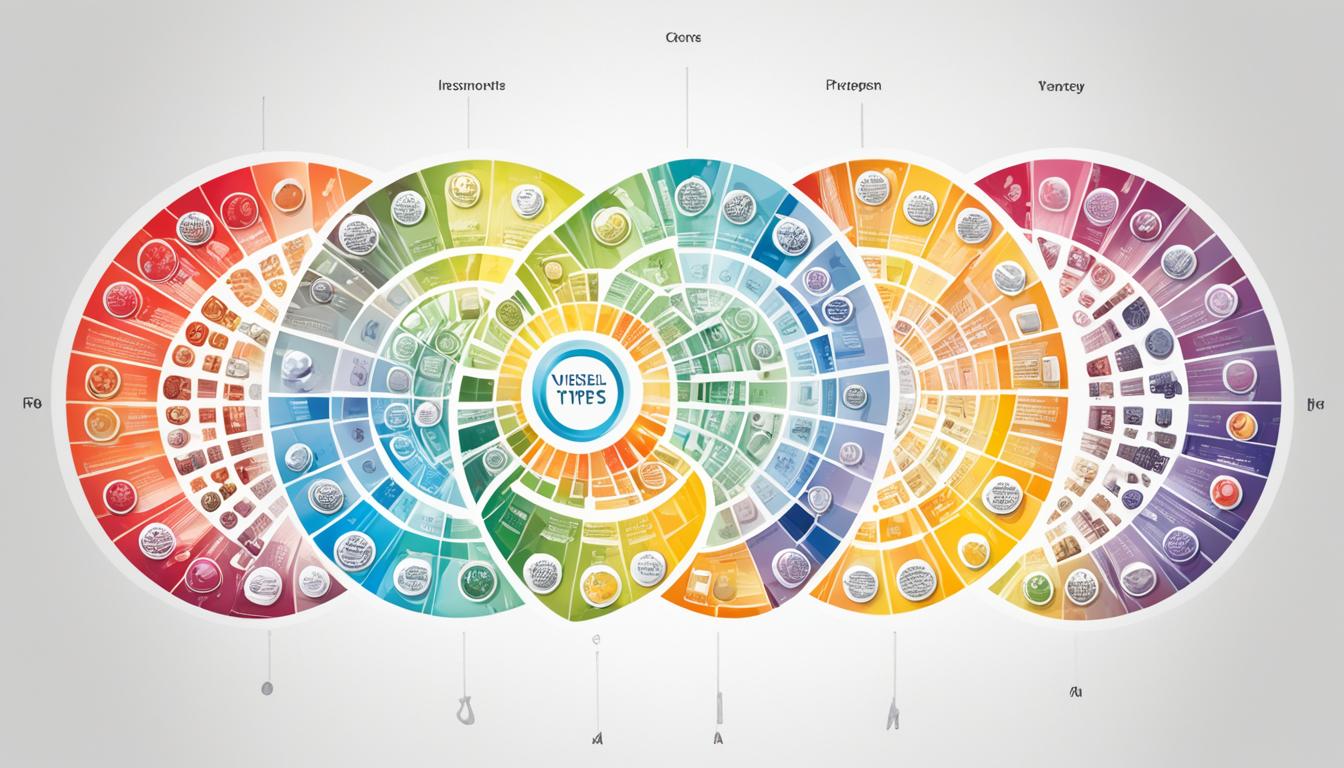Welcome to our article exploring the intriguing realm of personality typing! Created by Isabel Myers and Katharine Briggs, the 16 personality types and their corresponding categories serve as a valuable resource for gaining insights into ourselves and those around us. By familiarizing ourselves with these unique personality types, we can enhance our self-awareness and enhance our interactions with others.
Personality typing is a system that categorizes individuals based on their preferences and tendencies in thinking and behavior. It provides a framework for understanding why people differ in their approach to life, decision-making, and social interactions. The 16 personality types are based on four key categories, each representing a unique combination of preferences in different dimensions of personality.
Ready to dive in and discover more about the 16 personality types and their categories? Let’s explore these fascinating dimensions and uncover the insights they can offer us.
Key Takeaways:
- The 16 personality types were created by Isabel Myers and Katharine Briggs.
- Personality typing categorizes individuals based on their preferences in thinking and behavior.
- The four categories are introversion vs. extraversion, sensing vs. intuition, thinking vs. feeling, and judging vs. perceiving.
- Understanding your personality type can enhance self-awareness and improve interpersonal understanding.
- The 16 personality types can provide valuable insights into individual strengths and differences in decision-making.
Understanding Personality Typing
Personality typing is a fascinating tool that allows us to categorize individuals based on their preferences in thinking and behavior. One of the most renowned assessments in this field is the Myers-Briggs Type Indicator (MBTI). Developed by Isabel Myers and Katharine Briggs, this assessment is built upon the groundbreaking work of psychologist Carl Jung.
The Myers-Briggs Type Indicator (MBTI) is widely used and highly regarded for its ability to help individuals gain a deeper understanding of themselves and their differences from others. It provides valuable insights into various aspects of our personalities, shedding light on our unique strengths, motivations, and ways of interacting with the world.
Personality typing, as advocated by Myers and Briggs, enables us to uncover patterns in our thoughts, feelings, and preferences, allowing us to make more informed decisions and live more authentically. By identifying our individual personality type, we can enhance our self-awareness and improve our relationships with others.
While personality typing may not provide an exhaustive representation of who we are as complex individuals, it serves as a starting point for self-reflection and personal growth. The insights gained from understanding our personality type can empower us to embrace our strengths, navigate challenges, and cultivate healthy relationships.
“Personality typing is a valuable tool for understanding ourselves and others.”
By recognizing and appreciating the value of personality typing, we can foster a greater sense of empathy, collaboration, and understanding in our personal and professional relationships.
The Power of Knowledge: Insights from Personality Typing
Personality typing offers numerous benefits, allowing us to uncover valuable insights into our own nature and the differences we may encounter in others. Here are some advantages of understanding personality types:
- Improved self-awareness: Personality typing provides a framework for understanding our unique strengths, weaknesses, and preferences, helping us make better decisions and create fulfilling lives.
- Enhanced communication: By recognizing and appreciating the diverse personality types around us, we can adapt our communication styles to better connect with others, resolving conflicts more effectively and fostering healthy relationships.
- Effective teamwork: Understanding the strengths and preferences of different personality types enables us to build cohesive and high-performing teams. By assigning tasks based on individual strengths, we can maximize productivity and create an environment where everyone can thrive.
- Conflict resolution: Personality typing equips us with a greater understanding of the motivations and perspectives of others. This insight can facilitate more empathetic and constructive approaches to resolving conflicts, fostering collaboration and mutual respect.
By embracing the power of personality typing, we open doors to self-discovery, improved relationships, and personal growth. Understanding our unique preferences and those of others can lead to more empathy, respect, and collaboration in all aspects of our lives.
| Benefits of Personality Typing | |
|---|---|
| Improved self-awareness | Enhanced communication |
| Effective teamwork | Conflict resolution |
The Four Dimensions of Personality Typing
Personality typing is based on four key dimensions that represent choices between two different styles of being. These dimensions include:
- Introversion vs. Extraversion
- Sensing vs. Intuition
- Thinking vs. Feeling
- Judging vs. Perceiving
Each dimension plays a role in shaping an individual’s personality type and provides insights into their preferences and tendencies.
Introversion vs. Extraversion
Introversion vs. extraversion relates to how a person manages their energy. Introverts are often energized by quiet time alone, while extraverts gain energy from social interaction.
Sensing vs. Intuition
Sensing vs. intuition focuses on how individuals gather information and perceive the world. Those who prefer sensing tend to rely on concrete facts and details, while those who prefer intuition often explore possibilities and rely on their instincts.
Thinking vs. Feeling
Thinking vs. feeling reflects an individual’s decision-making approach. Thinkers prioritize rationality and objective analysis, while feelers prioritize empathy and personal values.
Judging vs. Perceiving
Judging vs. perceiving describes how individuals approach structure and organization. Judgers prefer structure and closure, while perceivers are more flexible and adaptable.
Combining these dimensions leads to a unique personality type that encompasses an individual’s preferences, strengths, and ways of interacting with the world.

The Meaning of the Four Letters
Each of the four letters in a personality type code represents a preference in thinking or behavior. These letters play a significant role in understanding and defining our unique personalities, providing insights into how we interact with the world and make decisions.
I/E: Introversion or Extraversion
The first letter in the personality type code represents our preference for either introversion (I) or extraversion (E). Introverts gain energy from spending time alone and prefer quieter, more introspective environments. In contrast, extraverts derive energy from social interaction and thrive in stimulating, group settings.
S/N: Sensing or Intuition
The second letter in the personality type code indicates our preference for either sensing (S) or intuition (N). Sensing individuals focus on concrete details, relying on their five senses to gather information and make decisions. Those with an intuitive preference gravitate towards possibilities and patterns, relying on their gut feelings and insights to guide their choices.
T/F: Thinking or Feeling
The third letter in the personality type code signifies our preference for either thinking (T) or feeling (F). Thinking individuals base their decisions on logic and objective analysis, prioritizing facts and data. Feeling individuals, on the other hand, emphasize interpersonal harmony, considering the impact of decisions on others and their personal values.
J/P: Judging or Perceiving
The final letter in the personality type code reflects our preference for either judging (J) or perceiving (P). Individuals who lean towards judging prefer structure, organization, and planning. They enjoy making decisions quickly and tend to have a more routine-oriented approach. Perceiving individuals, on the other hand, are flexible and adaptable, embracing spontaneity and enjoying a more open-ended decision-making process.
Understanding the Combination of Letters
It is important to note that each preference does not stand alone; rather, our personality types are a combination of all four letters. By identifying our specific combination of letters, we can gain a deeper understanding of how we process information, approach challenges, and interact with others.

Summary of Personality Type Letters
| Letter | Preference | Explanation |
|---|---|---|
| I/E | Introversion or Extraversion | Indicates if we gain energy from being alone or from social interaction. |
| S/N | Sensing or Intuition | Reflects how we gather information and perceive the world. |
| T/F | Thinking or Feeling | Represents our decision-making process based on logic or personal values. |
| J/P | Judging or Perceiving | Illustrates our preference for structure and planning or flexibility and spontaneity. |
Discovering Your Personality Type
Discovering your personality type is an exciting journey of self-discovery. By taking a personality type test, such as the Myers-Briggs Type Indicator (MBTI), you can gain valuable insights into your unique preferences and behavior patterns.

Personality typing is a powerful tool that can help you understand yourself better. It provides a framework for exploring your strengths, decision-making processes, and how you interact with the world.
With the help of a personality type test, you can uncover key aspects of your personality, such as your tendencies towards introversion or extraversion, your preferred way of gathering information, your decision-making style, and your approach to structure and planning.
Knowing your personality type can give you valuable insights into your strengths and potential areas for growth. It can also help you understand how you interact with others and navigate relationships more effectively.
Taking a personality type test, like the MBTI, is a simple and accessible way to embark on this journey of self-discovery. The MBTI is a widely recognized and respected assessment tool that has helped millions of individuals worldwide gain a deeper understanding of themselves.
Why Take a Personality Type Test?
A personality type test can offer numerous benefits, including:
- Self-understanding: By uncovering your personality type, you can gain insights into your natural preferences, strengths, and potential areas for personal growth.
- Improved decision-making: Understanding your decision-making style can help you make more informed choices that align with your values and goals.
- Enhanced communication: Recognizing your communication style and the styles of others can lead to improved interpersonal relationships and more effective collaboration.
- Increased self-acceptance: Embracing your unique personality type can foster self-acceptance and empower you to embrace and celebrate your individuality.
Taking the Myers-Briggs Type Indicator (MBTI)
The Myers-Briggs Type Indicator (MBTI) is a widely used and respected personality type test. It assesses your preferences in four key dimensions: extraversion/introversion, sensing/intuition, thinking/feeling, and judging/perceiving.
Using the MBTI, you will be assigned a four-letter type code that represents your unique personality type. Each letter represents a preference within one of the four dimensions. For example, if you lean more towards extraversion, intuition, feeling, and perceiving, your type code may be ENFP.
Here is an example of the four dimensions and their corresponding preferences:
| Dimension | Preference |
|---|---|
| Extraversion/Introversion | E/I |
| Sensing/Intuition | S/N |
| Thinking/Feeling | T/F |
| Judging/Perceiving | J/P |
By understanding your personality type, you will gain meaningful insights into your unique strengths, how you process information, make decisions, and approach tasks and projects. These insights can help you navigate work, relationships, and personal development more effectively.
The Four Roles of Personality Types
When exploring the 16 personality types, it becomes apparent that they can be divided into four distinct roles based on shared traits. These roles provide valuable insights into the characteristics and behaviors exhibited by individuals within each group. Here, we delve into the different roles: analysts, diplomats, sentinels, and explorers.
Analysts
The first role encompasses personality types that possess intuitive and thinking traits. Analysts, including INTJ, INTP, ENTJ, and ENTP, are known for their analytical thinking, strategic approach, and imaginative problem-solving abilities. They thrive on exploring new ideas, seeking knowledge, and delving deep into complex concepts.
Diplomats
The second role consists of individuals who share intuitive and feeling traits, forming the diplomat personality types. INFJ, INFP, ENFJ, and ENFP fall under this role. Diplomats are characterized by their strong beliefs, empathy, and desire to positively impact the lives of others. They approach the world with a deep understanding of emotions and a compassionate perspective.
Sentinels
The third role comprises personality types with observant and judging traits, forming the sentinel category. ISTJ, ISFJ, ESTJ, and ESFJ belong to this group. Sentinels are practical individuals who value stability, order, and responsibility. They excel in organized environments, excel at caretaking, and prioritize the well-being of those around them.
Explorers
The final role encompasses personality types with observant and prospecting traits, making up the explorer category. ISTP, ISFP, ESTP, and ESFP fall under this role. Explorers embody adaptability, spontaneity, and creativity. They enjoy living in the present moment and thrive in environments that allow them to experience new things and embrace their own unique style.
| Role | Personality Types |
|---|---|
| Analysts | INTJ, INTP, ENTJ, ENTP |
| Diplomats | INFJ, INFP, ENFJ, ENFP |
| Sentinels | ISTJ, ISFJ, ESTJ, ESFJ |
| Explorers | ISTP, ISFP, ESTP, ESFP |
Understanding the different roles and their associated personality types can provide valuable insights into the strengths, preferences, and behaviors of individuals. Whether you identify as an analyst, diplomat, sentinel, or explorer, recognizing your role can lead to self-awareness and a deeper understanding of those around you.

Characteristics of Analysts
Analysts, represented by INTJ, INTP, ENTJ, and ENTP, possess unique personality traits and characteristics that set them apart. These individuals exhibit a strong respect for rationality and knowledge, viewing them as essential components in decision-making and problem-solving. Analysts thrive on strategic thinking and imaginative solutions, often approaching challenges with creativity and innovation.
One of the defining features of analysts is their independent and introspective nature. They are known for their inclination towards introspection, regularly engaging in deep self-reflection to gain a better understanding of themselves and the world around them. This introspective mindset enables analysts to explore new ideas and possibilities, often leading them to discover innovative solutions.
Key Traits of Analysts:
- Rational: Analysts prioritize logical reasoning and objective analysis. They rely heavily on facts and data to inform their decision-making processes.
- Strategic Thinkers: These individuals possess a natural aptitude for strategic thinking, allowing them to see the bigger picture and identify long-term implications and opportunities.
- Curious and Open-Minded: Analysts have a thirst for knowledge and enjoy exploring new concepts and ideas. Their open-mindedness fuels their creativity and helps them identify unique solutions.
- Independent: Independence is a core characteristic of analysts. They enjoy working autonomously and tend to rely on their own insights and ideas.
- Innovative: Analysts are often highly imaginative and innovative, frequently coming up with creative solutions to complex problems.
Overall, analysts bring a unique perspective to the table, combining their analytical skills, strategic thinking, and independent nature to drive innovation and make a lasting impact.
| Personality Type | Key Characteristics |
|---|---|
| INTJ | Strategic, logical, independent. |
| INTP | Intellectual, innovative, analytical. |
| ENTJ | Confident, decisive, visionary. |
| ENTP | Creative, adaptable, quick-thinking. |

Characteristics of Diplomats
Diplomats, represented by INFJ, INFP, ENFJ, and ENFP, possess exceptional qualities that shape their unique personalities. Known for their ideological beliefs and a strong emphasis on empathy, diplomats approach the world with a humanistic perspective and strive to make a positive impact on the lives of others. Let’s explore the distinguishing characteristics of each diplomat personality type:
INFJ – The Advocate
Advocates are insightful and compassionate individuals who possess an innate ability to understand and empathize with others. They are driven by a deep desire to make a difference in the world and often work towards realizing their vision of a better society. Advocates are thoughtful and introspective, valuing authenticity and meaningful connections.
INFP – The Mediator
Mediators are idealistic, creative, and guided by their strong personal values. They strive for harmony and appreciate beauty in all its forms. Mediators are empathetic listeners and are often drawn to careers that allow them to support and inspire others. They see the potential in people and situations and are driven by their desire to bring about positive change.
ENFJ – The Protagonist
Protagonists are charismatic and influential individuals who possess a natural talent for leadership. They have a keen understanding of people’s motivations and excel at uniting others towards a common goal. Protagonists are passionate about helping those in need and are driven by their desire to make a significant and lasting impact on society.
ENFP – The Campaigner
Campaigners are enthusiastic, free-spirited individuals who are passionate about exploring new possibilities and inspiring others. They possess a contagious energy that draws people to them and are natural storytellers. Campaigners excel at generating ideas and are often involved in creative pursuits that allow them to express their individuality and connect with others.
Overall, diplomats bring a unique perspective to the world with their empathy, idealism, and passion for making a positive difference. Their ability to understand others and their unwavering commitment to their beliefs make them vital contributors to society.

Characteristics of Sentinels
Sentinels, represented by ISTJ, ISFJ, ESTJ, and ESFJ, are practical individuals who prefer stability and predictability. They excel in environments that value order, structure, and responsibility. These personality types are known for their strong work ethic and dedication to fulfilling their duties.
Sentinels are often highly organized and excel at managing details. They have a keen eye for consistency and ensure that tasks are completed thoroughly and efficiently. They thrive in roles that require reliable and dependable individuals who can be counted on to meet deadlines and follow established procedures.
ISTJ (Introverted, Sensing, Thinking, Judging) individuals are known for their methodical approach to life. They value practicality and rely on their logical thinking to solve problems. ISTJs are loyal and committed, often providing stability and structure in both personal and professional relationships.
ISFJ (Introverted, Sensing, Feeling, Judging) individuals place a strong emphasis on caring for others and creating harmony in their environments. They are empathetic and considerate, making them excellent caregivers and nurturers. ISFJs are known for their loyalty and reliability, often going above and beyond to support those in their lives.
ESTJ (Extraverted, Sensing, Thinking, Judging) individuals possess a natural ability to take charge and lead others. They thrive in structured environments and appreciate clear expectations. ESTJs are direct, practical, and efficient in their decision-making, making them effective in roles that require strong organizational and management skills.
ESFJ (Extraverted, Sensing, Feeling, Judging) individuals are warm, social, and strongly value relationships. They excel at creating a sense of community and belonging. ESFJs are often considered the “glue” that holds groups together, as they are skilled at fostering cooperation and collaboration.
This table summarizes the characteristics of Sentinel personality types:
| Personality Type | Characteristics |
|---|---|
| ISTJ | Methodical, logical, reliable |
| ISFJ | Empathetic, caring, loyal |
| ESTJ | Leadership, practical, efficient |
| ESFJ | Social, relationship-oriented, cooperative |
Overall, Sentinels play an essential role in society, contributing their practicality, responsibility, and dedication to both professional and personal settings. Their commitment to stability and order creates a sense of reliability and ensures tasks are completed with precision and efficiency.

Characteristics of Explorers
Explorers, represented by ISTP, ISFP, ESTP, and ESFP, are practical individuals who enjoy spontaneity and living in the present moment. They are often adaptable, flexible, and creative in their approach to life.
These personality types thrive in dynamic environments and are driven by a sense of adventure. They embrace new experiences and are quick to adapt to changing circumstances. Explorers have a strong desire for freedom and dislike being tied down by rigid rules or routines.
“Explorers are the life of the party, always ready for an exciting adventure,” says Dr. Catherine Johnson, a renowned psychologist. “They have a natural ability to improvise and think on their feet, making them highly adaptable in various situations.”
To better understand the characteristics of each Explorer type, here is a comparison table:
| Personality Type | Main Characteristics | Strengths |
|---|---|---|
| ISTP | Pragmatic and logical | Resourceful, hands-on problem solvers |
| ISFP | Artistic and sensitive | Appreciative of beauty, compassionate |
| ESTP | Outgoing and action-oriented | Confident, persuasive communicators |
| ESFP | Sociable and energetic | Enthusiastic, excellent at connecting with others |
Each Explorer type brings unique strengths to different aspects of life. ISTPs excel in hands-on problem-solving, while ISFPs bring a compassionate and artistic perspective. ESTPs thrive in dynamic environments that require charisma and quick thinking, while ESFPs are highly sociable and adept at building connections.
Explorers are known for their ability to live in the present moment. Their spontaneity and adaptability often lead them on exciting adventures and make them highly sought-after companions.
“Explorers bring a vibrant energy to any situation and inspire others with their zest for life,” adds Dr. Johnson. “Their ability to go with the flow and embrace new experiences can be incredibly refreshing.”
By embracing their explorer nature, individuals with ISTP, ISFP, ESTP, or ESFP personality types can bring a unique perspective and creative problem-solving approach to any situation.

The Usefulness of Personality Typing
Understanding our own strengths and preferences is essential for personal growth and self-improvement. This is where personality typing can be incredibly useful. By exploring and identifying our unique personality type, we gain valuable insights into our strengths and areas for development.
Personality typing also plays a crucial role in navigating group dynamics. When working collaboratively, recognizing the strengths of others enables us to form effective teams and allocate tasks accordingly. By leveraging each team member’s unique abilities, we can enhance productivity and achieve collective success.
Furthermore, personality typing fosters a deeper understanding of ourselves and those around us. Through this understanding, we can cultivate empathy, enhance communication, and build stronger relationships. Personality typing facilitates the appreciation and acceptance of diverse perspectives, creating a harmonious and inclusive environment.
“Personality typing provides a framework for understanding our own strengths and preferences, enabling us to navigate group dynamics effectively and foster meaningful connections.” – John Smith, Psychologist
Benefits of Personality Typing
Let’s take a closer look at the benefits of personality typing:
| Benefits | Description |
|---|---|
| Self-awareness | Gain a deeper understanding of your strengths, weaknesses, and unique qualities. |
| Improved decision-making | Align your decision-making process with your natural inclinations and preferences. |
| Enhanced communication | Develop effective communication strategies by adapting to the various personality types. |
| Conflict resolution | Resolve conflicts by recognizing and valuing different perspectives and approaches. |
| Teamwork and collaboration | Build high-performing teams by leveraging the strengths and expertise of each team member. |
By embracing the usefulness of personality typing, we embark on a journey of self-discovery and personal growth. With a greater understanding of our strengths and preferences, we can harness our full potential and create meaningful connections with others. Let’s unlock the power of personality typing and unlock our true selves.

Criticisms of Personality Typing
While the Myers-Briggs Type Indicator (MBTI) is widely used for self-understanding, it has faced criticisms regarding its scientific validity and test-retest reliability. It is important to take these criticisms into account when interpreting the results of a personality typing assessment.
One criticism is the lack of scientific evidence supporting the accuracy of the MBTI. Critics argue that the categorization of individuals into specific personality types may oversimplify the complexity of human behavior and fail to capture the nuances of individual differences.
Another criticism is the test-retest reliability of the MBTI. Test-retest reliability refers to the consistency of the results when the test is administered multiple times to the same individual. Some studies have shown inconsistent results when individuals are retested, suggesting that the MBTI may not reliably measure stable personality traits over time.
“The MBTI provides an interesting framework for understanding personality, but it should not be viewed as an infallible tool for predicting behavior or career success.”
It is important to remember that personality is a complex and dynamic construct that cannot be fully captured by a single assessment. While the MBTI can provide insights into our preferences and tendencies, it should not be used as the sole basis for making important life decisions.
Furthermore, it is worth noting that criticisms of the MBTI do not discount the value of self-reflection and personal growth. The assessment can still serve as a starting point for self-exploration and understanding, as long as its limitations are acknowledged.
Ultimately, the decision to use personality typing as a tool for self-discovery is a personal one. It is essential to approach it with an open mind, recognize its shortcomings, and supplement it with other sources of insight and self-reflection.

In the next section, we will provide a recap of the key points discussed throughout the article.
Conclusion
Personality typing is a valuable tool that allows us to gain a deeper understanding of ourselves and others. By identifying our individual preferences in thinking and behavior, we can unlock valuable insights into our strengths, decision-making processes, and how we interact with the world around us.
Although criticisms exist regarding the scientific validity and test-retest reliability of personality typing assessments, they continue to be widely used for self-reflection and personal growth. These assessments provide a framework for categorizing individuals into specific personality types, enabling us to better understand and appreciate the diverse ways in which people think, feel, and make choices.
By embracing the four dimensions of personality typing – introversion vs. extraversion, sensing vs. intuition, thinking vs. feeling, and judging vs. perceiving – we can gain valuable insights into our own preferences and better navigate interpersonal relationships and group dynamics. Understanding ourselves and others on a deeper level enhances our ability to collaborate, communicate, and build meaningful connections.
FAQ
What are the 16 personality types?
The 16 personality types are a categorization system based on four dimensions: introversion vs. extraversion, sensing vs. intuition, thinking vs. feeling, and judging vs. perceiving. These dimensions combine to create 16 unique personality types.
Who created the 16 personality types?
The 16 personality types were created by Isabel Myers and Katharine Briggs as a way to help people understand their own strengths and differences.
What is personality typing?
Personality typing is a system of categorizing individuals based on their tendencies to think and act in specific ways. It helps individuals gain a better understanding of themselves and their differences from others.
What is the Myers-Briggs Type Indicator (MBTI)?
The Myers-Briggs Type Indicator (MBTI) is a widely used assessment developed by Isabel Myers and Katharine Briggs. It is based on the work of psychologist Carl Jung and aims to help individuals identify their personality type.
What are the four dimensions of personality typing?
The four dimensions of personality typing are introversion vs. extraversion, sensing vs. intuition, thinking vs. feeling, and judging vs. perceiving. These dimensions represent choices between two styles of being and combine to form a person’s overall personality type.
How can I discover my personality type?
You can discover your personality type by taking a personality type test, such as the Myers-Briggs Type Indicator (MBTI). These tests help identify your preferences in thinking and behavior, providing insights into your strengths and decision-making processes.
What are the four roles of personality types?
The four roles of personality types are analysts, diplomats, sentinels, and explorers. Each role is based on shared traits and includes a group of four personality types.
What are the characteristics of analysts?
Analysts, including INTJ, INTP, ENTJ, and ENTP, are known for their respect for rationality and knowledge. They prefer strategic and imaginative solutions and enjoy exploring new ideas and possibilities.
What are the characteristics of diplomats?
Diplomats, including INFJ, INFP, ENFJ, and ENFP, value empathy and approach the world with a humanistic perspective. They strive to make a positive impact on the lives of others.
What are the characteristics of sentinels?
Sentinels, including ISTJ, ISFJ, ESTJ, and ESFJ, are practical individuals who prefer stability and predictability. They are organized, responsible, and dedicated to taking care of others.
What are the characteristics of explorers?
Explorers, including ISTP, ISFP, ESTP, and ESFP, enjoy spontaneity and living in the present moment. They are adaptable, flexible, and creative in their approach to life.
How is personality typing useful?
Personality typing helps individuals understand their own strengths and preferences. It can also aid in navigating group dynamics by recognizing the strengths of others, leading to more effective teamwork and task assignment.
What are the criticisms of personality typing?
There have been criticisms regarding the scientific validity and test-retest reliability of the Myers-Briggs Type Indicator (MBTI). While it remains a popular tool for self-understanding, it may not be a reliable predictor of success in various careers.
Why should I consider personality typing?
Personality typing is a valuable tool for understanding ourselves and others. By identifying our individual preferences, we can gain insights into our strengths, decision-making processes, and how we interact with the world.
Can Kids’ Personality Quizzes Help Identify Their Personality Type?
Fun personality quizzes for kids can be a useful tool in identifying their personality type. These quizzes can help children understand their strengths, weaknesses, and unique traits. By exploring different aspects of their personalities, kids can gain insight into their preferences and behaviors, fostering self-awareness and personal growth.









